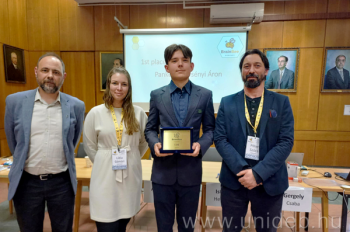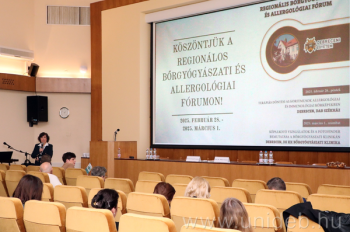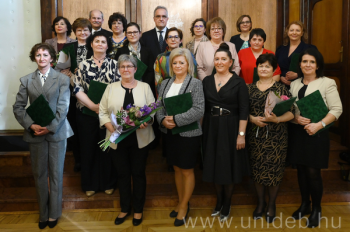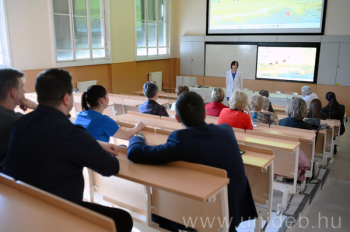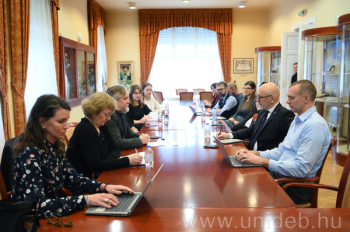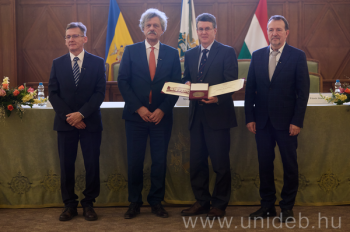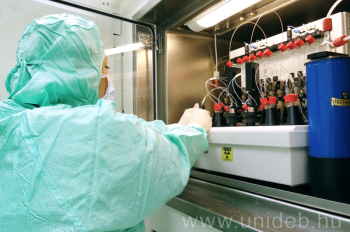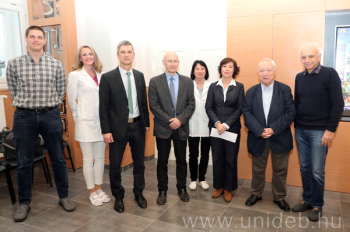A super-resolution laser microscope has been used recently at the Faculty of Medicine of the University of Debrecen primarily in cancer research and skeletal muscle research. It can also be applied to observe the function and interactions of biological macromolecules. This piece of equipment is already being put to use by several institutes of the faculty in a variety of research projects but, in the future, it could also play an important part in scientific collaborations with national and international partners.
Hírek Faculty of Medicine címkével
The Department of Surgery of the University of Debrecen Clinical Centre organized a symposium entitled Robotic Surgery for Everyone (Robotsebészet mindenkinek) on the experiences gained since the launch of the Robotic Surgery Centre last April. The event, held at the Headquarters of the Debrecen Regional Committee of the Hungarian Academy of Sciences (DAB), was dedicated to a discussion of the place, role and results of robot-assisted surgery in clinical practice in Debrecen, including an overview of the particularities of each medical specialty.
A student from the Kossuth Lajos Secondary and Primary School of the University of Debrecen won the Hungarian final of Brain Bee, the prestigious international neuroscience competition for secondary school students. Áron Pankucsi-Versényi will represent Hungary in the world final of the contest in the autumn.
In Hungary, it is only the Clinical Center of the University of Debrecen that can offer a state-funded FotoFinder-assisted examination for the early detection of melanoma. The new imaging device capable of providing such a chance was presented to a professional audience at this year's Regional Dermatology and Allergology Forum. At their two-day meeting, which started on Friday, the attending specialists also discussed the most recently available therapeutic options for allergic and immunological diseases.
Nine health workers of the Clinical Centre of the University of Debrecen were honoured for their high quality and exemplary professional work on Wednesday at a ceremony held on the occasion of the Hungarian Nurses' Day. At the event, in addition to the Outstanding Worker Medal and the Reward Award, Presidential Letters of Commendation and the titles of Chief Clinical Physician were also presented.
In Hungary, around 10,000 new cases of lung cancer are diagnosed every year and around nine thousand people die from the disease, even though there is a good chance of curing lung cancer if it is detected at an early stage. The latest research findings and state-of-the-art treatment options for lung cancer were discussed at a professional symposium held on Monday at the Pulmonology Clinic of the University of Debrecen Clinical Centre in connection with World Cancer Day.
Several representatives of the University of Debrecen are also participating in an international research and curriculum development program on vaccination headed by WHO’s (World Health Organization) Regional Office for Europe. The chief objective of this project is to increase vaccination coverage. Staff members from Department of Public Health and Epidemiology recently met with a WHO delegation at our university to discuss the details of this project.
This year's Debrecen Award for Molecular Medicine (DAMM) has been awarded by the Faculty of Medicine of the University of Debrecen to Professor Stephen W. Scherer, Head of Research at SickKids, the Hospital for Sick Children affiliated with the University Toronto. As a molecular biologist, he has achieved breakthroughs in research on autism, among other things. Professor Scherer received the award on Tuesday at a ceremony held at the University of Debrecen.
PET (Positron Emission Tomography) scans with radioactively labeled glucose are essential in the diagnosis of patients with tumors and in the exact determination of their therapy. The first PET examination in Hungary was conducted in Debrecen in 1994. Since then, the University of Debrecen has played an important part in launching all PET testing sites in our country, either by transferring knowledge or by providing human resources.
Doctors and specialists from Slovakia recently visited the Burns Department of the Dermatology Clinic of the University of Debrecen Clinical Centre. The Hungarian and Slovakian specialists presented the latest technologies and surgical techniques they use and shared their experience and expertise in daily patient care.


